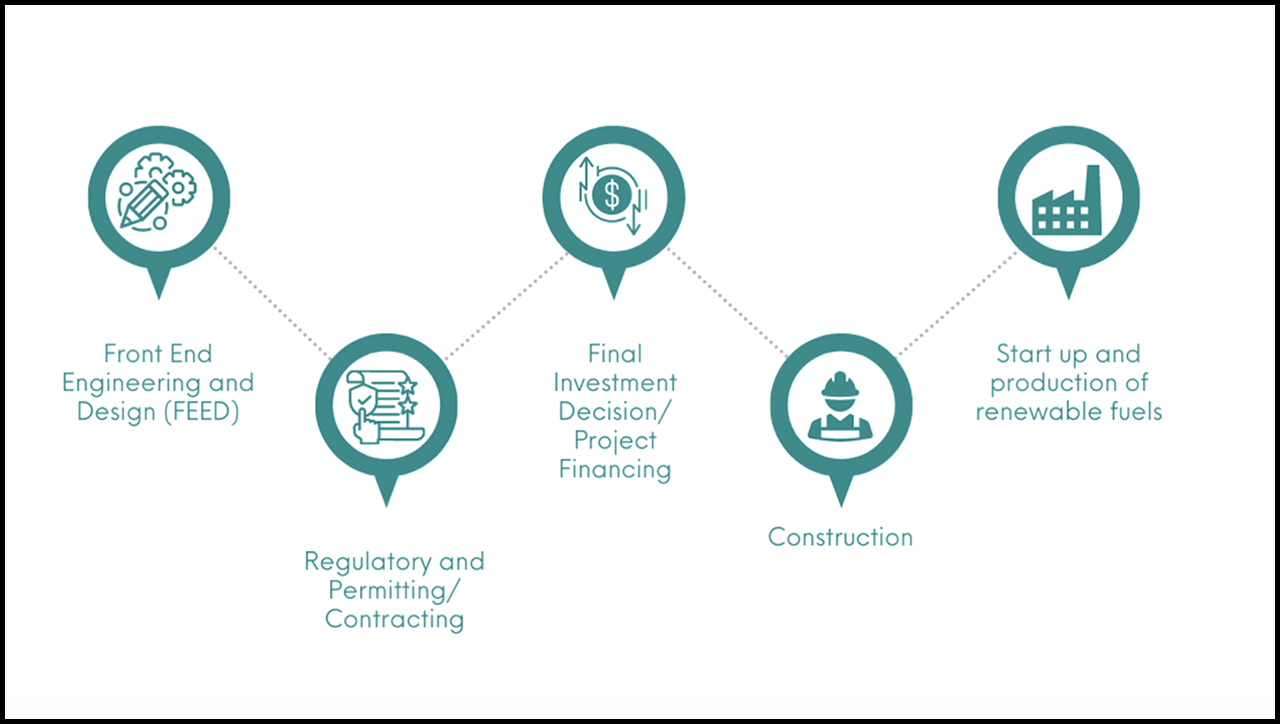
Azure Planning CN-Served Renewable-Fuel Production Facility
Written by Marybeth Luczak, Executive Editor
Azure expects all FEED (Front End Engineering and Design) work for its renewable-fuel production facility to be complete by the end of 2024, positioning it to reach a Final Investment Decision (FID) in the first half of 2025, which would enable a 2027 in-service date. (Azure Image)
Azure Sustainable Fuels Corp. (Azure) on Jan. 18 reported advancing the development of a Canadian renewable-fuel production facility that will ultimately produce 20,000 barrels per day of predominantly SAF (Sustainable Aviation Fuel). The facility, to be served by CN, is expected to open in 2027.
SAF is considered “an essential component in reducing emissions in Canadian and global aviation, providing a renewable alternative that can reduce emissions by up to 80% relative to the fossil-based jet fuels that the aviation industry is currently reliant upon,” according to Azure, which is based in Calgary, Alberta. “SAF is a certified drop-in replacement fuel for commercial airlines and is already in use today across the globe.”
The company said it is developing three Canadian SAF-focused renewable-fuel production facility sites in parallel “to maximize optionality”; these potential sites are located in British Columbia, Manitoba and Ontario.
With C$40 million in funding to date—including a recent investment from Natural Resources Canada’s Clean Fuels Fund, Canada Infrastructure Bank (CIB) and the government of Manitoba—Azure reported that it is now fully funded through the completion of the Front End Engineering and Design (FEED) stage.
The company expects all FEED work for each of the three sites to be complete by the end of 2024, positioning it to reach a Final Investment Decision (FID) in the first half of 2025, which would enable a 2027 in-service date.
The facility is expected to be constructed in two phases, each phase capable of producing about 10,000 barrels per day of renewable fuels with a designed total capacity per site of 20,000 barrels per day. According to Azure, at full capacity the facility will process approximately 1 million tons of feedstock to produce approximately 265 million gallons of renewable fuels annually. No fossil products will be used as a feedstock, reported Azure, which noted that it is working to minimize the use of fossil fuels as an energy source for process operations. The facility will employ 150 full-time people.
Azure reported that it has secured strategic partnerships with CN; Shell Catalysts & Technologies, a facility processes technology provider; RICHARD Design Services, an engineering, procurement and construction firm; Savage, a supply chain infrastructure provider; and Bartlett, a Savage subsidiary and agribusiness that focuses on the acquisition, storage, transportation, processing, and merchandising of grain, and that supplies all classes of wheat, food-grade corn, and soybeans. It has also teamed with Tk̓emlúps te Secwépemc in British Columbia to co-develop a facility on their ancestral lands and continues to advance discussions with local Indigenous groups in Manitoba and Ontario.
Additionally, Azure said it is “engaged in numerous conversations with end users of SAF, including some of the largest potential customers in the Canadian market,” and continues to advance discussions to secure “offtake agreements for additional product from the facility.”

“Our ambition is to develop the first SAF-dedicated renewable fuel production facility of scale in Canada, by utilizing Canadian skillsets and natural resources,” Azure CEO Douglas Cole said. “We have established critical partnerships with leaders in their respective industries that are required to successfully construct and operate a facility of this nature. At the same time, we have worked closely with federal, provincial, and Indigenous governments to adhere to all regulations and requirements.”
“We are proud to partner with Azure in support of the transition to a low-carbon future,” said CN President and CEO Tracy Robinson, Railway Age’s 2024 Railroader of the Year. “Our unique network will enable Azure to reach key markets and customers of sustainable aviation fuel.”
“We are lending our many years of experience in refining to support Azure’s goals of developing a Canadian domiciled SAF facility,” said Elise H. Nowee, President of Shell Catalysts & Technologies. “Azure selected the Shell Renewable Refining Process (SRRP) technology for its flexibility in design to produce high yields of renewable diesel or SAF.”
“RICHARD has completed the design and construction efforts associated with the successful start-up of numerous renewable distillates facilities,” RICHARD Design Services Chief Strategy Officer Dean Wenner said. “Our extensive and valuable industrial experience in regards to pretreatment, hydroprocessing, railcar loading/unloading, power distribution, modular design electrical buildings, modular unit designs, and associated OSBL [Outside Battery Limits] needs results from our well-rounded and comprehensive services delivered by great people.”
“We’re pleased to partner with Azure to build a solution for the domestic supply of sustainable aviation fuel in Canada, part of our ongoing efforts to optimize North American supply chains for renewable transportation fuels,” said Jason Ray, President-Infrastructure Sector at Savage. “As a leader in rail infrastructure design, construction, and operations, as well as rail transloading and rail logistics, Savage is uniquely positioned to ensure efficient, sustainable, and safe operations for the tank, track, and rail facilities associated with Azure’s projects.”
“By partnering with Azure through our FEED financing, we are supporting a made-in-Canada solution to expand production of sustainable aviation fuels, leverage Canada’s agricultural sector, and reduce greenhouse-gas emissions in the aviation sector,” CIB CEO Ehren Cory said. “This is an exciting first step for the CIB, and we look forward to advancing more projects such as carbon capture and storage, hydrogen and clean fuels with our FEED financing initiative.”



